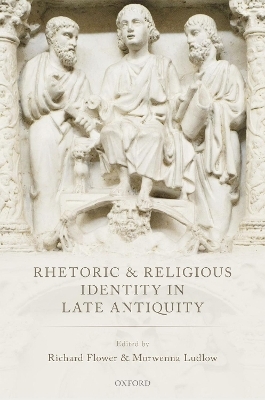
Rhetoric and Religious Identity in Late Antiquity
Oxford University Press (Verlag)
978-0-19-881319-4 (ISBN)
The topic of religious identity in late antiquity is highly contentious. How did individuals and groups come to ascribe identities based on what would now be known as 'religion', categorizing themselves and others with regard to Judaism, Manichaeism, traditional Greek and Roman practices, and numerous competing conceptions of Christianity? How and why did examples of self-identification become established, activated, or transformed in response to circumstances? To what extent do labels (whether ancient and modern) for religious categories reflect a sense of a unified and enduring social or group identity for those included within them? How does religious identity relate to other forms of ancient identity politics (for example, ethnic discourse concerning 'barbarians')? Rhetoric and Religious Identity in Late Antiquity responds to the recent upsurge of interest in this issue by developing interdisciplinary research between classics, ancient and medieval history, philosophy, religion, patristics, and Byzantine studies, expanding the range of evidence standardly used to explore these questions. In exploring the malleability and potential overlapping of religious identities in late antiquity, as well as their variable expressions in response to different public and private contexts, it challenges some prominent scholarly paradigms. In particular, rhetoric and religious identity are here brought together and simultaneously interrogated to provide mutual illumination: in what way does a better understanding of rhetoric (its rules, forms, practices) enrich our understanding of the expression of late-antique religious identity? How does an understanding of how religious identity was ascribed, constructed, and contested provide us with a new perspective on rhetoric at work in late antiquity?
Prof Richard Flower studied for his BA, MPhil and PhD in Classics at Clare College, Cambridge, and has worked at the Universities of Cambridge, Sheffield and Exeter. He specialises in the construction of imperial and ecclesiastical authority, particularly in late-antique polemical literature and heresiology. His publications include Emperors and Bishops in Late Roman Invective (Cambridge, 2013) and Imperial Invectives against Constantius II (Liverpool, 2016), and he is also editing The Cambridge Companion to Christian Heresy. Prof Morwenna Ludlow studied Classics and then Theology at the University of Oxford. She has written widely on Gregory of Nyssa. Her latest book, Art, Craft and Theology in Fourth Century Greek Authors (also published by OUP) examines the use of literary and rhetorical tropes by Christian authors and argues that they interpret themselves as both theologians and craftsmen with words.
1: Richard Flower and Morwenna Ludlow: Introduction
PART I: THE NATURE OF RELIGIOUS IDENTITIES AND THEIR REPRESENTATION
2: Éric Rebillard: Approaching 'Religious Identity' in Late Antiquity
3: Aaron P. Johnson: The Rhetoric of Pagan Religious Identities: Porphyry and his First Readers
4: Douglas Boin: The Maccabees, 'Apostasy' and Julian's Appropriation of Hellenismos as a Reclaimed Epithet in Christian Conversations of the Fourth Century C.E.
PART II: AGENTS OF THE REPRESENTATION OF RELIGIOUS IDENTITY
5: Shaun Tougher: Julian the Apologist: Christians and Pagans on the Mother of the Gods
6: Susanna Elm: Bodies, Books, Histories: Augustine of Hippo and the Extraordinary (civ. Dei 16.8 and Pliny, HN 7)
7: Raffaella Cribiore: Classical Decadence or Christian Aesthetics? Libanius, John Chrysostom, and Augustine on Rhetoric
8: Nicholas Baker-Brian: 'Very great are your words': Dialogue as Rhetoric in Manichaean Kephalaia
9: Maijastina Kahlos: 'A Christian Cannot Employ Magic': Rhetorical Self-fashioning of the Magicless Christianity of Late Antiquity
PART III: MODES OF THE REPRESENTATION OF RELIGIOUS IDENTITY
10: Mark Humphries: The Rhetorical Construction of a Christian Empire in the Theodosian Code
11: Peter Van Nuffelen: What Happened after Eusebius? Chronicles and Narrative Identities in the Fourth Century
12: Richard Flower: The Rhetoric of Heresiological Prefaces
13: Robin M. Jensen: Constructing Identity in the Tomb: The Visual Rhetoric of Early Christian Iconography
14: Hajnalka Tamas: Renunciation and Ascetic Identity in the Liber ad Renatum of Asterius Ansedunensis
15: Morwenna Ludlow: Christian Literary Identity and Rhetoric about Style
| Erscheinungsdatum | 26.10.2020 |
|---|---|
| Verlagsort | Oxford |
| Sprache | englisch |
| Maße | 162 x 241 mm |
| Gewicht | 604 g |
| Themenwelt | Geschichte ► Teilgebiete der Geschichte ► Religionsgeschichte |
| Religion / Theologie ► Christentum ► Kirchengeschichte | |
| ISBN-10 | 0-19-881319-8 / 0198813198 |
| ISBN-13 | 978-0-19-881319-4 / 9780198813194 |
| Zustand | Neuware |
| Informationen gemäß Produktsicherheitsverordnung (GPSR) | |
| Haben Sie eine Frage zum Produkt? |
aus dem Bereich


